
Indian Journal of Hematology and Blood Transfusion
Scope & Guideline
Exploring Innovations in Blood Disorders and Transfusion Science
Introduction
Aims and Scopes
- Clinical Hematology Research:
The journal publishes original research articles that explore various aspects of hematology, including studies on hematological malignancies, anemias, and bleeding disorders, with a focus on clinical implications and treatment outcomes. - Transfusion Medicine:
Research related to blood transfusion practices, safety, and efficacy is a core area of focus. This includes studies on blood donation, transfusion reactions, and the development of new transfusion protocols. - Innovative Therapeutic Approaches:
The journal highlights advancements in therapeutic strategies for managing hematological conditions, including novel drug therapies, stem cell transplantation, and gene therapies. - Laboratory Techniques and Diagnostics:
A significant emphasis is placed on the development and evaluation of laboratory techniques for diagnosing hematological disorders, encompassing molecular diagnostics, flow cytometry, and imaging techniques. - Public Health and Epidemiology in Hematology:
The journal addresses public health issues related to hematology, including epidemiological studies on blood disorders, awareness campaigns, and the impact of socio-economic factors on hematological health. - Patient-Centered Care:
Research exploring the quality of life, psychological aspects, and patient experiences in hematological care is a growing area of interest, reflecting a holistic approach to treatment.
Trending and Emerging
- Personalized Medicine and Genomics:
There is an increasing focus on personalized medicine, particularly in the context of hematological malignancies, where genomic profiling and targeted therapies are becoming prominent. - COVID-19 Related Hematology:
Research addressing the impact of COVID-19 on hematological patients, including complications and management strategies, has surged, reflecting the pandemic's significant influence on clinical practice. - Pediatric Hematology:
An increasing number of studies focus on pediatric hematology, particularly regarding conditions like thalassemia and leukemia, highlighting the need for tailored approaches in younger populations. - Novel Therapeutic Agents and Techniques:
Emerging therapies, such as CAR-T cell therapy and novel anticoagulants, are being increasingly explored, showcasing innovation in treatment methodologies. - Quality of Life and Patient-Centered Research:
There is a growing trend towards exploring the quality of life and psychological impacts of hematological disorders and their treatments, emphasizing a holistic view of patient care.
Declining or Waning
- Traditional Hematological Practices:
As the field progresses with new technologies and therapies, traditional practices in hematology, such as manual blood counts and basic transfusion protocols, are becoming less frequently reported. - Single Case Reports:
The journal has seen a decrease in the publication of single case reports, suggesting a shift towards more robust, larger cohort studies that provide broader insights into clinical practices. - Basic Science Research:
Although foundational research remains important, there is a noticeable decline in publications focusing purely on basic science without direct clinical application, as the journal aims for a more translational approach. - Historical Reviews and Observational Studies:
The frequency of historical reviews and observational studies has decreased, with a preference for studies that employ more rigorous methodologies such as randomized controlled trials or systematic reviews.
Similar Journals

GEMATOLOGIYA I TRANSFUZIOLOGIYA
Exploring Innovations in Blood ScienceGEMATOLOGIYA I TRANSFUZIOLOGIYA is an esteemed journal published by the MINISTERSTVO ZDRAVOOKHRANENIYA in the Russian Federation, focusing on the vital fields of hematology and transfusion medicine. With a rich history dating back to its inception in 1983, the journal plays a significant role in disseminating critical research and advancements in these areas, particularly relevant given the evolving landscape of medical science. As a recognized publication, it is indexed in Scopus and holds a Q4 category ranking in Hematology for 2023, reflecting its niche but important contributions to the field. Researchers, healthcare professionals, and students can look forward to a variety of peer-reviewed articles that not only address contemporary issues but also pave the way for innovative practices in hematology. Although it does not currently offer open access, the journal remains a valuable resource for those seeking to stay informed about the latest findings and developments.

Journal of Hematology
Empowering Research, Transforming LivesThe Journal of Hematology, published by ELMER PRESS INC, serves as a pivotal platform for disseminating cutting-edge research in the field of hematology. With an ISSN of 1927-1212 and an E-ISSN of 1927-1220, this journal is committed to advancing scientific knowledge and clinical practice through high-quality peer-reviewed articles encompassing all aspects of blood disorders, from basic science to health policy implications. While the journal currently operates under a traditional access model, it nonetheless prioritizes the rapid publication of significant findings, ensuring that researchers, clinicians, and students have timely access to the latest advancements in hematological research. Positioned to bridge gaps in knowledge and foster collaboration among scholars worldwide, the Journal of Hematology is an essential resource for anyone invested in this vital area of medicine.
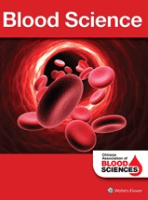
Blood Science
Exploring the Frontiers of Blood ScienceBlood Science is a distinguished peer-reviewed journal published by Lippincott Williams & Wilkins, focusing on the dynamic field of hematology. Since its inception, the journal has aimed to disseminate high-quality research and innovative findings that contribute to our understanding of blood-related health issues. With the ISSN 2543-6368, it offers a platform for academic discussions and breakthroughs in various subfields including hematopathology, blood disorders, and transfusion medicine. As of 2023, Blood Science is ranked in the third quartile (Q3) within the hematology category, indicating a burgeoning influence among its peers, with a Scopus rank of #101 out of 137 journals, placing it in the 26th percentile. Although it is not an open-access journal, it provides essential insights and valuable data for researchers, healthcare professionals, and students alike, enhancing the collective knowledge and practices in hematology. With a publication period spanning from 2019 to 2024, Blood Science remains committed to fostering the advancement of blood science research and enhancing patient care methodologies.
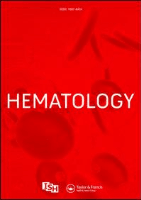
Hematology
Transforming Hematology: Open Access to Tomorrow's DiscoveriesHematology is a distinguished open-access journal published by Taylor & Francis Ltd, dedicated to advancing research and knowledge in the field of hematology. Established in 1996, the journal has continually evolved to meet the needs of a growing community of researchers and practitioners, providing a vital platform for disseminating innovative findings and clinical insights. With its impact factor reflecting a robust commitment to quality scholarship, Hematology has achieved a respectable position in its category as evidenced by its Q3 ranking in the Hematology category and ranks #85 out of 137 in the Scopus index, which positions it in the 38th percentile among its peers. The journal’s open-access policy, initiated in 2019, further enhances its reach and accessibility, allowing a broad audience of professionals, researchers, and students to engage with high-quality research without barriers. By covering a wide range of topics related to blood disorders, treatment methodologies, and emerging therapies, Hematology stands as an essential resource for those dedicated to innovation in this critical area of healthcare.
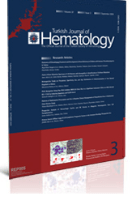
Turkish Journal of Hematology
Innovating knowledge in the field of hematology since 1999.Turkish Journal of Hematology is an esteemed publication dedicated to advancing the field of hematology, producing influential research since its inception in 1999 under the auspices of GALENOS PUBL HOUSE. With an Open Access model, it facilitates widespread dissemination of knowledge, allowing researchers, clinicians, and students to stay abreast of the latest developments in blood disorders and treatments. With an ISSN of 1300-7777 and an E-ISSN of 1308-5263, the journal holds a commendable position in the academic community, evidenced by its 2023 Q3 ranking within the hematology category and its standing at #80 out of 137 in the Scopus database, placing it in the 41st percentile. Covering a wide scope of topics within hematology, this journal serves as a critical resource for disseminating innovative research and clinical practices pertinent to the ongoing challenges faced in this vital area of medicine. With its continuous publication until 2024, Turkish Journal of Hematology remains a beacon for enhancing the understanding and treatment of hematological conditions within the Turkish and global medical communities.

INTERNATIONAL JOURNAL OF HEMATOLOGY
Pioneering Discoveries in Hematological ScienceThe INTERNATIONAL JOURNAL OF HEMATOLOGY, published by SPRINGER JAPAN KK, serves as a critical platform for advancing research in the field of hematology. With a prestigious history spanning over three decades from 1991 to 2024, this journal is recognized for its impactful contributions, evidenced by its Q2 category ranking in Hematology for 2023, and its notable position at rank #71 out of 137 in the Scopus Medicine Hematology category. Researchers and professionals within the hematology community benefit from the journal's rigorous peer-reviewed articles that cover a wide range of topics, including clinical studies, basic research, and novel therapeutic strategies. Though currently non-open access, it provides essential insights and findings to an audience passionate about the latest advancements in blood disorders and treatments. Situated in Japan, the journal not only showcases high-quality research but also fosters a global exchange of knowledge in hematology, making it a significant resource for scholars, practitioners, and students alike.
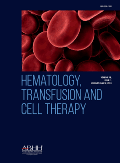
Hematology Transfusion and Cell Therapy
Elevating standards in cell therapy and transfusion science.Hematology Transfusion and Cell Therapy, published by Elsevier, is a leading Open Access journal dedicated to advancing the fields of hematology, immunology, and transfusion medicine. Since its establishment in 2018, this journal has provided a vital platform for sharing innovative research and clinical advancements in the management of blood disorders and cellular therapies. Based in Brazil, it attracts a global audience, facilitating access to high-quality research that influences clinical practice and policy. With a current impact factor that places it in the Q3 category for both hematology and immunology as of 2023, the journal is recognized for its rigorous peer-review process and commitment to disseminating significant findings. By featuring a diverse range of articles, from original research to reviews, Hematology Transfusion and Cell Therapy aims to foster collaboration and knowledge sharing among researchers, professionals, and students alike, empowering them to tackle emerging challenges in their fields.
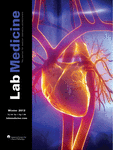
AMERICAN JOURNAL OF CLINICAL PATHOLOGY
Empowering Research in Pathology and MedicineThe American Journal of Clinical Pathology, published by Oxford University Press Inc, stands as a vital resource in the fields of pathology and clinical medicine. With a rich history dating back to 1945 and an impressive impact factor reflected in its Q1 ranking in Pathology and Forensic Medicine, this journal serves as a cornerstone for researchers and professionals seeking to advance their knowledge and practice. Covering a breadth of topics within the discipline, it is recognized in 2023 as ranked #24 out of 208 in its category, highlighting its esteemed reputation within the scientific community. Although the journal does not currently offer open access, its rigorous peer-reviewed articles and cutting-edge research make it an essential addition to any academic or clinical library. The ISSN for print version is 0002-9173, with an E-ISSN of 1943-7722 available for digital access. Researchers, students, and practitioners alike will benefit from its comprehensive scope and commitment to disseminating high-quality scientific inquiry.
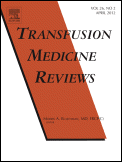
TRANSFUSION MEDICINE REVIEWS
Connecting researchers and practitioners in transfusion medicine.TRANSFUSION MEDICINE REVIEWS is a prestigious journal dedicated to the advanced study of transfusion medicine and its related fields, published by W B SAUNDERS CO-ELSEVIER INC. With an outstanding reputation, it boasts an impressive impact factor and consistently ranks in the top quartile (Q1) across multiple categories, including Biochemistry (Medical), Clinical Biochemistry, and Hematology. Researchers will find valuable insights through its extensive coverage of pertinent topics, with a focus on the integration of clinical practices and laboratory science. While the journal does not currently offer open access, its content remains accessible through various institutional subscriptions, ensuring that vital information is available to the global scientific community. With a continuous publication history from 1987 to 2024, TRANSFUSION MEDICINE REVIEWS serves as a vital resource for academics, healthcare professionals, and students who seek to stay abreast of the latest research findings and clinical practices in transfusion medicine.
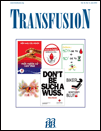
TRANSFUSION
Transforming Hematology Through Innovative ResearchTRANSFUSION is a prestigious peer-reviewed journal published by WILEY, dedicated to advancing the field of hematology and transfusion medicine. With an ISSN of 0041-1132 and an E-ISSN of 1537-2995, this journal serves as a vital resource for researchers and professionals alike, delivering high-quality studies and reviews that impact clinical practice and blood management strategies. The journal enjoys a strong reputation, evidenced by its impressive Q1 ranking in hematology and Q2 in both immunology and allergy as of 2023. Covering foundational aspects from 1958 to 2024, TRANSFUSION not only provides valuable insights but also fosters collaboration and innovation in understanding the complexities of blood donation, transfusion practices, and immunological responses. With its significant contributions to the scientific community, this journal is essential for those seeking to stay at the forefront of research and advancements in transfusion science.